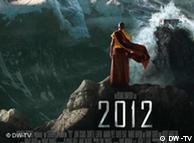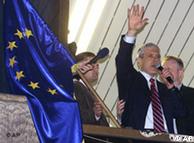Thursday, December 31, 2009
ALAFROSHMEIOMATA
Monday, December 21, 2009
Alternative Religions | 21.12.2009
Emmerich's "2012" film highlights growing interest in the end of the world
What will you be doing on December 22, 2012? Most people assume they will be worrying about the fact that they only have two more shopping days before Christmas. But if a growing number of other people are to be believed, none of us will have anything to worry about - because we won't be here. Any of us.
December 22, 2012 could be the day after the end of the world. According to certain interpretations of ancient prophecies, a series of cataclysmic or transformative events will occur on or around December 21, 2012, the end-date of the 5,125-year-long Mayan calendar.
The Hollywood blockbuster "2012," directed by German director Roland Emmerich, has brought a version of the Mayan prophesy to the masses, but the disaster flick paints a very bleak picture of 2012.
The ancient Maya never explained in detail what would happen when their calendar reached the final day. Some people joke that they just ran out of stone tablets. Optimistic seers predict that, rather than meeting a messy end, humanity will enter a new level of consciousness - a meta- rather than physical change.
 Bildunterschrift: Großansicht des Bildes mit der Bildunterschrift: Violent sun storms are a popular part of prophecies
Bildunterschrift: Großansicht des Bildes mit der Bildunterschrift: Violent sun storms are a popular part of prophecies
But believers in apocalyptic prophesy have seized upon December 21, 2012 as the date for humanity's Judgment Day. Despite having their beliefs rejected by various schools of scientific thought, end-times soothsayers subscribe to the Emmerich version of events and remain convinced that the majority of the human race will have checked out by the 22nd.
Theories on the nature of the predicted disaster are legion. Some believe a cosmic alignment of planets will position earth in the direct firing line of some immense galactic energy burst which will crack the plant like a nut. Others believe a mysterious Planet X will return from the far reaches of space on an orbit which will wreak havoc on earth - or even collide with it. Some say it will be our own fault and that the CERN particle accelerator will create a black hole that will swallow up the planet, while traditionalists hedge their bets on the rise of the Antichrist.
Doomsday cults preparing for 2012
For every cataclysm, there seems to be a group, movement or sage who has based its teachings and lifestyle on preparing for the worst. One of them is the New Global Trust, based near Antwerp.
According to Sandrine Mathen from the Belgian Federal Center of Information on Harmful Sects (CIASON), the New Global Trust envisages a post-apocalyptic world virtually destroyed by the effects of violent sun storms. The Trust believes that only those willing and strong enough to start from zero will survive and only those deemed suitable will be brought into its secretive "survival group" to begin the painfully slow business of rebuilding civilization.
Another group recruiting potential survivors is led by Belgian astronomer and end-times author Patrick Geryl, who states that 2012 will mark a physical catastrophe and immense disaster for humankind. Again, Geryl's main argument is that "upheavals in the sun's magnetic fields will generate gigantic solar flares that will affect the polarity of the entire earth," causing the earth's magnetic fields to reverse at once with disastrous effects.
Geryl is now focusing on establishing a survival group. Only those with money and resources will be permitted to this group, which is planning to relocate to concrete bunkers high in the mountains of Africa.
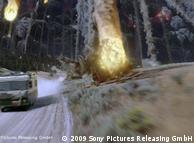 Bildunterschrift: Cult experts fear groups may take their own lives to avoid the potential horrors of 2012 - like the lava explosions shown in "2012"
Bildunterschrift: Cult experts fear groups may take their own lives to avoid the potential horrors of 2012 - like the lava explosions shown in "2012"
Concerns over possible pre-emptive deaths
At least at the moment, these groups appear to be concentrating on surviving the possible tribulations of 2012. Historical evidence suggests there could be others which may not wait for the end of the world before shaking off the collective mortal coil, instead choosing to pre-empt the coming apocalypse by voluntarily - or forcibly - taking their own lives.
Groups that set an apocalyptic end-date and then kill themselves as it dawns are rare, but those which do inevitably attract mass media attention.
"The followers of the Restoration of the Ten Commandments of God in Uganda believed that death was the only way to ascend to heaven," George Chryssides, an honorary research fellow in contemporary religion at the University of Birmingham, told Deutsche Welle.
"Their leader predicted that the world would end on December 31, 1999, but when this failed to materialize, a new date was set for the following April. Anywhere between 500 and 1,000 people died the following year when the church they were in was bolted shut from the inside and set on fire. It's still unclear though whether this was a suicide linked to the end-date or a murderous event to cover up suspected crimes," added Chryssides.
The case in Uganda highlights one of the major downsides of leading a group which has a definite apocalyptic end-date: what to tell your followers when nothing happens.
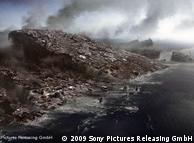 Bildunterschrift: Those living on the Californian coast are among those hoping Roland Emmerich is wrong
Bildunterschrift: Those living on the Californian coast are among those hoping Roland Emmerich is wrong
The day after the end of the world
So what will happen if the doomsday followers wake up on December 22, 2012 to find that humanity is still going strong and the world remains intact?
"Groups have two options," said Chryssides, "To re-calculate the date or to 'spiritualize' it."
He was witness to the end-time event of a group called Solara, two decades ago in the UK. They predicted "the Opening of the Gate" and set time and date for when it would occur.
"Nothing at all happened," said Chryssides, "but the leader announced that 'the Gate is open,' and everyone seemed convinced that something important had taken place. This is a prime example of how a group can 'spiritualize' its predictions: If nothing appears to happen at a physical level, then it must be happening at some spiritual one."
When a prophecy fails, some followers just leave the group, said Suzanne Newcombe from INFORM, the London-based Information Network Focus on Religious Movements. "Sometimes groups choose another date for the fulfillment of the prophecy if it is accepted that something was incorrect in their original calculations or how signs were interpreted."
Newcombe also said that groups sometimes take the failure of an apocalyptic prophecy to materialize as a sign that their combined actions and commitment averted the impending disaster. Or, in the case of a positive prophecy, that the believers may not have been "good enough" to create a better world.
Getting it wrong
Chryssides added that it's very rare for a group's leader to apologize and admit a mistake was made in the prophecy.
"This happened once in the Watch Tower movement, in 1925, when leader Joseph Franklin Rutherford predicted the return of the Patriarchs - or Old Testament leaders - in that year," Chryssides said. "They were predicted to rise from their graves. Rutherford even bought a house for them to live in. This prediction was too physical and specific to be able to be spiritualized, and when pressed he admitted candidly that he was wrong - although he still entertained a belief that they would some day return."
In a more recent case, Pyotr Kuznetsov, a self-declared prophet and leader of the True Russian Orthodox Church, predicted that the end of the world would come in the spring of 2007 and sent his followers underground to wait for the doomsday. When that day passed, he found himself trying to change the minds of those he himself had brainwashed.
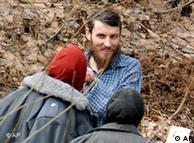 Bildunterschrift: Großansicht des Bildes mit der Bildunterschrift: Kuznetsov got his date wrong but his followers stayed put
Bildunterschrift: Großansicht des Bildes mit der Bildunterschrift: Kuznetsov got his date wrong but his followers stayed put
"When Kuznetsov realized he was wrong about doomsday, he admitted his mistake and tried to convince them to leave their hideout," said CIAOSN's Sandrine Mathen. "Members of the group refused, saying that the situation would only end with the apocalypse."
His followers slowly emerged from the cave over the following months after a siege by Russian authorities, while Kuznetsov tried to commit suicide and was hospitalized.
Ancient prophesies, scientific theories and astronomical projections can all be spun to either support or debunk beliefs about how and when we make our final departure. Whatever you believe, the fact is that the world still exists and those who chose doomsday dates in the past have all been proven wrong. Only time will tell whether we'll all still be here on December 22, 2012 - on the day after the end of the world.
Author: Nick Amies
Editor: Kate Bowen
European Union | 20.12.2009
Serbia formally announces bid to join European Union
Serbia's application to join the European Union now goes to Sweden, who currently holds the rotating EU presidency.
Belgrade had said it would apply for membership to the 27-nation bloc last month, but had since been debating the timing of the application.
Serb President Boris Tadic said EU officials have discussed his country's potential membership, and he expressed optimism for his country's bid.
"This is a great day for Serbia and its citizens," he said, adding that "no one can doubt the road that Serbia has taken: Serbia is going towards European integration."
EU leaders divided on support
While several EU countries including Germany, Italy and Greece have backed Belgrade's bid, some key members such as the United Kingdom and the Netherlands have reservations.
The former Yugoslav republic has been under pressure to increase cooperation with the UN war crimes tribunal in The Hague, and the Dutch have been blocking Serbia's bid due to certain war crimes fugitives still being at large.
Belgrade's announcement came on the same day that the EU opened its borders to Serbia, Montenegro and Macedonia for visa-free travel within the so-called Schengen zone.
Citizens of the three Balkan states can now travel more easily to all EU countries but the UK and Ireland, as well as Norway, Switzerland and Iceland.
acb/dpa/AFP
Editor: Andreas Illmer
Holocaust | 21.12.2009
Demjanjuk presents German law with an almost impossible problem
The trial of John Demjanjuk, a Ukrainian former prisoner-of-war turned concentration camp guard, has once again lifted the lid on questions about how the German justice system has dealt with the murderers of the Holocaust.
Not least among these questions is: 'why now?' Even by the glacial time-scale dictated by the law, the Demjanjuk trial has been a long time coming. The file of evidence against him has not changed since his identity was established in 1993, when an Israeli court cleared him of being a notorious Treblinka guard called Ivan the Terrible. A single identity card is the main piece of evidence: it shows that Demjanjuk was indeed a guard at Sobibor, probably between March and September 1943, and therefore must have helped murder at least 27,900 people thought to have died there in that period.
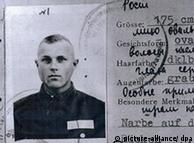 Bildunterschrift: Großansicht des Bildes mit der Bildunterschrift: Demjanjuk's ID is the main piece of evidence
Bildunterschrift: Großansicht des Bildes mit der Bildunterschrift: Demjanjuk's ID is the main piece of evidence
But the rest of the evidence against Demjanjuk is either circumstantial or mitigating. Most of the 35 plaintiffs are simply relatives of those killed at Sobibor, and the four actual survivors of the camp are too old to have a reliable memory of him or his immediate actions. The defense lawyer Ulrich Busch has repeatedly argued that Demjanjuk is also a victim of the Nazi regime: as a Ukrainian prisoner of war, Demjanjuk became a Trawniki - one of the many local non-Germans trained as guards in the easternmost concentration camps - to avoid starvation.
Why now?
Busch also asked the question 'why now?' in court in the first days of the trial in early December. Demjanjuk has only been legally pursued for these crimes since 2001. Busch pointed to the trials of Demjanjuk's superiors that had resulted in acquittals - particularly that of Karl Streibel, a Trawniki recruiter, tried in Germany in 1976 and scandalously acquitted after his attorneys successfully argued that he did not know what the guards he trained would be used for. "How can those that give the orders be innocent, when those that receive them are guilty?" Busch asked the court.
Angelika Benz, a PhD history student writing a thesis on the eastern Polish concentration camps, visited the first days of the Demjanjuk trial and described the central difficulty in blunt terms. "Even though we know what happened at Sobibor, the problem is that this crime - the Holocaust - simply can't be dealt with by our judicial system," Benz told Deutsche Welle, "This becomes clear when we're dealing with someone like Demjanjuk - someone about whom we know very little." With so many facts missing about Demjanjuk's actions and motivations, his judges are forced to redefine the law according to the general and abstract definition of the Holocaust itself.
The judges' answer to Busch's question of how Demjanjuk could be considered guilty when the man who may have trained him had been acquitted was simple - the past mistakes of the German judiciary need not be repeated. This signal that past judgements in Nazi trials are irrelevant, even flawed, is apparently necessary if any judgement can be passed on Demjanjuk at all.
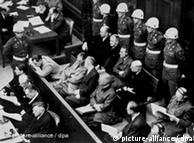 Bildunterschrift: Großansicht des Bildes mit der Bildunterschrift: Only the decision-makers were originally put on trial
Bildunterschrift: Großansicht des Bildes mit der Bildunterschrift: Only the decision-makers were originally put on trial
The precedents are useless
The historian Joerg Friedrich became famous when he published two provocative books on the Nazi trials in the early 1980's - "Freispruch fuer die Nazi-Justiz" ("Acquittal for the Nazi-Judiciary") and "Die Kalte Amnestie" ("The Cold Amnesty") - in which he argued that the German judiciary had failed to bring the Nazi perpetrators to justice. Now he believes that the judiciary has come round to his point of view, and is attempting to correct its mistake by going after the last remaining perpetrators with new vigor. The trial of 88- year-old Heinrich Boere, a Dutch member of the SS, is also currently under way in Aachen after decades of legal prevarication and a tireless campaign to bring him to justice.
Friedrich believes that the Demjanjuk trial illustrates two important developments in the German judiciary's attitude to the Holocaust. Firstly, that it is rethinking, or being forced to rethink, its definition of a Holocaust perpetrator. Secondly, that it is prepared to lower the bar of required evidence in order to convict Holocaust perpetrators.
But Boere's crime is much easier to define than Demjanjuk's - he is accused of, and has admitted to, three specific acts of murder. By current German law, this is the crime that Demjanjuk will have to be found guilty of if he is to be convicted - of all the crimes that Demjanjuk may or may not have committed, murder is the only one that has not exceeded its time-bar limit. Germany lifted that limit on murder in the 1960's.
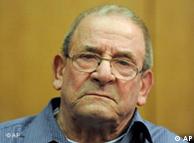 Bildunterschrift: Großansicht des Bildes mit der Bildunterschrift: Heinrich Boere's trial is also under way in Aachen
Bildunterschrift: Großansicht des Bildes mit der Bildunterschrift: Heinrich Boere's trial is also under way in Aachen
"This is a problem that judges in the 50's, 60's, 70's and 80's ignored," Friedrich told Deutsche Welle, "The majority of Holocaust-perpetrators were seen as abetters, those that helped the murderers. The actual murderers were always defined as Hitler, Himmler, Eichmann - those that made the decision to instigate the Holocaust - or those that showed a personal motivation in the act. Murder is not simply killing someone - you must prove intent and motivation to ensure a conviction. The abetters were those that helped Hitler, but had no motives of their own - they simply carried out their tasks."
This narrow definition of the murderers of the Holocaust appears in almost all Nazi trial judgements from previous trials. Simply working in a concentration camp never convicted anyone. But this is all that can be established beyond doubt about Demjanjuk. In order to convict him, the judges will essentially have to redefine murder for the extreme and abstract circumstances of the Holocaust.
A long chain
"In previous Nazi trials, those that were convicted were the so-called 'concentration camp monsters' - people who had been seen tormenting, abusing, or beating Jews before their execution," Friedrich explains, "Such actions were considered 'personal contributions', and people were convicted not of being abetters to the crime but of being co-perpetrators."
This goes some way to explaining why so few people were convicted of Holocaust crimes in Germany. According to an article in news magazine Der Spiegel on the legacy of German guilt, of over 100,000 investigations that were carried out in postwar Germany into Nazi crimes, only around 6,500 people were convicted. Thirteen death sentences were passed, 167 life sentences, and the rest received shorter prison sentences or fines. Only a fifth of those convictions were for murder.
"For the German judiciary, the Holocaust only ever existed within the camp gates," Friedrich points out, "But in fact the Holocaust was a long chain. The whole of society played dumb and those that did the bloody work appeared in court."
Author: Ben Knight
Editor: Rob Mudge/from DW
Saturday, December 19, 2009
Τουρκία, μάχη εξουσίας στο Κουρδικό/kathimerini
Του Σταυρου Λυγερου
Το Κουρδικό αναδεικνύεται σε παράγοντα κλειδί όχι μόνο για την εσωτερική ευστάθεια της Τουρκίας, αλλά και για τη συνεχιζόμενη μάχη εξουσίας ανάμεσα στο κυβερνών Κόμμα Δικαιοσύνης και Ανάπτυξης (AKP) και στο κεμαλικό κατεστημένο. Με βασικό όπλο τη δικαστική διερεύνηση της υπόθεσης Εργκένεκον (ο σιδερένιος βραχίονας του βαθέος κράτους), ο Ταγίπ Ερντογάν είχε για τα καλά στριμώξει τους στρατηγούς, υποχρεώνοντάς τους επανειλημμένως σε αναδίπλωση.
Μέσα σε κλίμα πολιτικής ηγεμονίας δρομολόγησε το αποκαλούμενο Δημοκρατικό Ανοιγμα για πολιτική λύση του Κουρδικού. Η πολιτική αυτή άρχισε σταδιακά να παίρνει σάρκα και οστά. Πρωτοβουλίες καλής θέλησης, μάλιστα, όπως η παράδοση ομάδας Κούρδων ανταρτών, τροφοδότησαν ελπίδες για γρήγορη διευθέτηση.
Το άνοιγμα Ερντογάν είχε τη θερμή υποστήριξη της Ουάσιγκτον. Οι Αμερικανοί επιδιώκουν τη σταθεροποίηση γενικά του Ιράκ και ειδικότερα του κουρδικού κρατιδίου στο βόρειο τμήμα της χώρας, το οποίο είναι και το πιστότερο έρεισμά τους στην ευρύτερη περιοχή. Για να διευκολύνουν τη σταθεροποίηση, προωθούν την εξομάλυνση των σχέσεων της Αγκυρας και με τη Βαγδάτη και με το Αρμπίλ.
Βήματα προς αυτή την κατεύθυνση έκαναν και οι δύο πλευρές, αλλά υπάρχει πάντα το αγκάθι των Κούρδων της Τουρκίας. Γι’ αυτό και οι ΗΠΑ ωθούν τον Ερντογάν να λύσει με πολιτικά μέσα έναν εθνοτικό πόλεμο, που έχει κοστίσει δεκάδες χιλιάδες νεκρούς, αποτελεί πηγή ανωμαλίας και λειτουργεί αποσταθεροποιητικά. Η πολιτική λύση του Κουρδικού, όμως, δεν είναι εύκολη υπόθεση. Υπάρχουν σοβαρά εμπόδια και στις δύο πλευρές.
Εντονες αντιδράσεις
Ο αρχηγός της κεμαλικής αντιπολίτευσης Ντενίζ Μπαϊκάλ κατηγόρησε το άνοιγμα Ερντογάν πως «θα καταστρέψει και θα διαιρέσει την Τουρκία». Οι βουλευτές του αποχώρησαν από την Εθνοσυνέλευση, όταν συζητήθηκε το θέμα. Την αρνητική θέση του εξέφρασε εμμέσως πλην σαφώς και ο αρχηγός ΓΕΕΘΑ, Ιλκέρ Μπασμπούγ.
Από την πλευρά του, το Kόμμα για μια Δημοκρατική Κοινωνία (DTP), που πολιτικά συνδέεται με το ΡΚΚ και εκφράζει την κουρδική ταυτότητα, δεν φαίνεται διατεθειμένο να αποδεχθεί μια (έτσι κι αλλιώς όχι πολύ ελκυστική) λύση που να μη συμπεριλαμβάνει τον Αμπντουλάχ Οτσαλάν. Τον τελευταίο καιρό, πραγματοποιούνται διαδηλώσεις για τη βελτίωση των απάνθρωπων συνθηκών κράτησής του, ακριβώς για να δηλωθεί ο καθοριστικός ρόλος του.
Ο ίδιος ο Οτσαλάν είχε υποδεχθεί θετικά το άνοιγμα Ερντογάν. Το ίδιο και ο πρόεδρος του DTP, Αχμέτ Τουρκ. Ο τελευταίος είχε δηλώσει ότι, εάν αλλάξει νοοτροπία το τουρκικό κράτος, τα όπλα των ανταρτών μπορεί να παραδοθούν σε τρεις μήνες. Στην πραγματικότητα και οι δύο εμμέσως υποδεικνύουν στον Ερντογάν να αποδεχθεί τον ιστορικό ηγέτη του ΡΚΚ ως παράγοντα της λύσης, αν όχι ως συνομιλητή.
Ο Οτσαλάν, όμως, είναι κόκκινο πανί όχι μόνο για τους κεμαλιστές, αλλά και για την πλειονότητα των Τούρκων. Ακόμα και εάν ο Ερντογάν το αποδεχόταν ως αναγκαίο κακό, είναι πολιτικά δύσκολο να το κάνει. Παρά το γεγονός ότι το μετακεμαλικό καθεστώς έχει αποτύχει να επιβάλει στρατιωτική λύση στο Κουρδικό, παραμένει κατηγορηματικά αντίθετο στην ίδια την ιδέα της πολιτικής λύσης. Το μόνο που αποδέχεται είναι παράδοση άνευ όρων του ΡΚΚ.
Μέσα σ’ αυτές τις συνθήκες, το Κουρδικό μετατράπηκε σε πεδίο για ένα νέο γύρο σύγκρουσης των δύο πόλων εξουσίας στην Τουρκία. Το εναρκτήριο λάκτισμα έδωσε μια επίθεση ανταρτών. Την ημέρα που ο Ερντογάν συναντούσε τον Ομπάμα στην Ουάσιγκτον, αντάρτες (χωρίς εντολή της ηγεσίας του ΡΚΚ, όπως δήλωσαν) σκότωσαν επτά στρατιώτες, που περιπολούσαν στην Τοκάτ, περίπου 500 χλμ. μακριά από τις κουρδικές περιοχές.
Η επίθεση είχε ισχυρό πολιτικό φορτίο. Μεταξύ των νεκρών ήταν και ένας λοχίας, ο οποίος μέχρι πρότινος ήταν δεσμοφύλακας του Οτσαλάν και είχε κατηγορηθεί ότι τον κακομεταχειριζόταν. Πλην αυτού του συμβολισμού, το ΡΚΚ απέδειξε ότι έχει δίκτυο και μπορεί να πραγματοποιεί δύσκολες καταδρομικές επιχειρήσεις σε όλη την Τουρκία.
Η όξυνση του κλίματος διευκόλυνε την αντεπίθεση του κεμαλικού κατεστημένου. Με πρόταση του εισαγγελέα Αμπντουραχμάν Γιαλτσίνκαγια, το Συνταγματικό Δικαστήριο έθεσε εκτός νόμου το κουρδικό DTP και απαγόρευσε την πολιτική δραστηριότητα για μια πενταετία σε 37 στελέχη του. Μεταξύ αυτών είναι ο πρόεδρος Τουρκ και η αντιπρόεδρος Αϊσέλ Τουγλούκ, που έχασαν και τη βουλευτική ιδιότητά τους. Ο ίδιος εισαγγελέας το 2008 είχε προτείνει την απαγόρευση του κυβερνώντος κόμματος.
Η απαγόρευση πυροδότησε μια αλυσίδα μαζικών και βίαιων διαδηλώσεων σε όλες τις μεγάλες πόλεις της Τουρκίας. Στη Βαν και στο Χακάρι, μάλιστα, οι διαδηλωτές εισέβαλαν σε συγκροτήματα που κατοικούν αξιωματικοί. Απέφυγαν τις βιαιοπραγίες, αλλά απέδειξαν ότι ούτε οι αξιωματικοί μπορούν να νιώθουν ασφαλείς στη νοτιοανατολική Τουρκία.
Είναι γενική η εκτίμηση ότι το Κουρδικό εισέρχεται σε μια νέα φάση όξυνσης, με αναδυόμενο στοιχείο τις συνεχείς μαζικές και δυναμικές διαδηλώσεις, που δικαιολογούν το χαρακτηρισμό «κουρδική ιντιφάντα». Στο σημείο όπου ωθούνται τα πράγματα, η Αγκυρα ή πρέπει να παίξει με τον Οτσαλάν ή να τον δολοφονήσει για να αφαιρέσει το εμπόδιο. Σε μια τέτοια περίπτωση, όμως, το κλίμα θα παροξυνθεί και οι κάθε είδους συγκρούσεις θα κλιμακωθούν με απρόβλεπτες συνέπειες.
Επιστροφή με νέο κόμμα
Στο πολιτικό επίπεδο, η πρώτη αντίδραση στην απαγόρευση ήταν η παραίτηση των 19 εναπομεινάντων βουλευτών του κουρδικού DTP, γεγονός που πιθανότατα θα οδηγούσε σε επαναληπτικές εκλογές. Ο Ερντογάν αντέδρασε στην απόφαση του Συνταγματικού Δικαστηρίου, χαρακτηρίζοντας την Τουρκία «νεκροταφείο πολιτικών κομμάτων». Στόχος του κεμαλικού κατεστημένου, άλλωστε, είναι περισσότερο το άνοιγμά του για πολιτική λύση του Κουρδικού παρά το απαγορευθέν DTP. Επιπροσθέτως, ήθελε πάση θυσία να αποτρέψει τις επαναληπτικές εκλογές, επειδή οι δημοσκοπήσεις δείχνουν μεγάλη πτώση του κόμματός του.
Ολα δείχνουν ότι ο Τούρκος πρωθυπουργός έδωσε κάποιες διαβεβαιώσεις στους Κούρδους βουλευτές, οι οποίες τους έπεισαν να μην επιμείνουν στην παραίτησή τους. Οι 19 εναπομείναντες βουλευτές ίδρυσαν το Κόμμα Ειρήνης και Δημοκρατίας και επανήλθαν στην Εθνοσυνέλευση. Η εξέλιξη εκτόνωσε κάπως το κλίμα στο κοινοβουλευτικό επίπεδο, αλλά όχι και στους δρόμους.
Ο Ερντογάν θέλει να δώσει συνέχεια στο Δημοκρατικό Ανοιγμά του. Η νεοοθωμανική στρατηγική του είναι συμβατή με την αναγνώριση της κουρδικής ταυτότητας και ορισμένων δικαιωμάτων πολιτιστικού χαρακτήρα. Και σ’ αυτό το επίπεδο έχει την υποστήριξη και Αμερικανών και Ευρωπαίων.
Από πολιτικής απόψεως, όμως, το έδαφος για πολιτική λύση του Κουρδικού έχει καταστεί ακόμα πιο δύσβατο. Οι τουρκικές ελίτ είναι διχασμένες σε αυτό το ζήτημα. Εκτός αυτού, όμως, στο γήπεδο του Κουρδικού διεξάγεται και η μάχη για την εξουσία. Αυτές τις ημέρες, ο αρχιστράτηγος Μπασμπούγ απείλησε εμμέσως πλην σαφώς τους δικαστές που ερευνούν την υπόθεση Εργκένεκον. Την καλύτερη απάντηση του την έδωσε ένας δημοσιογράφος, που έγραψε ότι το Γενικό Επιτελείο έχει κηρύξει ψυχολογικό πόλεμο εναντίον της κοινωνίας.
Wednesday, December 16, 2009
**Α. ΤΣΙΠΡΑΣ
Η αντιμετώπιση είναι θέμα βούλησης
Ο πρόεδρος της Κ.Ο. του ΣΥΡΙΖΑ Αλέξης Τσίπρας στην πρώτη του συμμετοχή σε συνάντηση των πολιτικών αρχηγών περιέγραψε τη διαφθορά ως πρόβλημα έλλειψης πολιτικής βούλησης.
 Απευθυνόμενος στον πρωθυπουργό τού έθεσε το ερώτημα εάν έχει αναλάβει δεσμεύσεις έναντι της Ευρωπαϊκής Ενωσης, επικαλούμενος τον διεθνή Τύπο. «Δεν μπορούμε να μιλάμε για δημόσια διαβούλευση και διάλογο όταν όλος ο διεθνής Τύπος βοά ότι έχετε αναλάβει δεσμεύσεις στην Ευρωπαϊκή Ενωση και δεν έχει γίνει συζήτηση στη Βουλή». Το περιέγραψε δηλαδή ως θέμα αξιοπιστίας.
Απευθυνόμενος στον πρωθυπουργό τού έθεσε το ερώτημα εάν έχει αναλάβει δεσμεύσεις έναντι της Ευρωπαϊκής Ενωσης, επικαλούμενος τον διεθνή Τύπο. «Δεν μπορούμε να μιλάμε για δημόσια διαβούλευση και διάλογο όταν όλος ο διεθνής Τύπος βοά ότι έχετε αναλάβει δεσμεύσεις στην Ευρωπαϊκή Ενωση και δεν έχει γίνει συζήτηση στη Βουλή». Το περιέγραψε δηλαδή ως θέμα αξιοπιστίας.
Για τη χρηματοδότηση των κομμάτων, παρατήρησε ότι «δεν μπορούμε να ζητούμε "πόθεν έσχες" από βουλευτές και υπουργούς και να μην το εφαρμόζουν τα κόμματα». Η τοποθέτηση του προέδρου της Κ.Ο. του ΣΥΡΙΖΑ είναι πιθανόν αυτή που προκάλεσε την αντίδραση της Αλέκας Παπαρήγα που στις δηλώσεις της, χωρίς να κατονομάσει τον Αλέξη Τσίπρα, είπε ότι στη σύσκεψη των πολιτικών αρχηγών ακούστηκαν «λίγο περίεργα πράγματα». Και πρόσθεσε ειρωνικά η κ. Παπαρήγα με νόημα: «Φαντάζομαι, ο κ. Χρυσοχοΐδης θα παρέμβει έπειτα από αυτό».
Στις δηλώσεις μετά τη σύσκεψη των πολιτικών αρχηγών, ο Αλ. Τσίπρας ανέφερε ότι «πρέπει να υπάρξουν παρεμβάσεις και στο θεσμικό πλαίσιο για την αντιμετώπιση της διαφθοράς». «Δεν θα μας σώσουν αυτές οι παρεμβάσεις από τα μεγάλα οικονομικά προβλήματα, από το μεγάλο θέμα της ανεργίας, της συρρίκνωσης της αγοραστικής δύναμης των πολιτών», είπε και ζήτησε για τον λόγο αυτό «αλλαγή του οικονομικού μοντέλου». Οπως ανέφερε, «χρειάζεται αλλαγή του μοντέλου ανάπτυξης. Με αυτή την έννοια νομίζω ότι θα έχουμε τη δυνατότητα το επόμενο διάστημα στη Βουλή να καταθέσουμε συγκροτημένα τις θέσεις και τις προτάσεις μας». Αναφέρθηκε στους άξονες των προτάσεών του για την καταπολέμηση της διαφθοράς που έχει να κάνει με:
- Την αναγκαία αλλαγή του νόμου περί ευθύνης υπουργών, για να σταματήσει αυτή η ατιμωρησία.
* Την αλλαγή του νόμου για τη χρηματοδότηση των κομμάτων.
* Την αλλαγή του θεσμικού πλαισίου για τις προμήθειες του Δημοσίου.
* Την αλλαγή του εκλογικού νόμου και την ψήφιση της «απλής και ανόθευτης αναλογικής».
* «Και το σημαντικότερο, την αλλαγή του θεσμικού πλαισίου για τα μέσα μαζικής ενημέρωσης».
- Εκτύπωση σελίδας
- Αποστολή με Email
- Διάδοση στο Google
- Διάδοση στο del.icio.us
- Διάδοση στο Stumbleupon
- Διάδοση στο Facebook
- Διάδοση στο Twitter
- Διάδοση στο Buzz
Διαβάστε επίσης
- Στην κατηγορία
- Πολιτική
- Με λέξεις-κλειδιά
- Διαφθορά
- ΣΥΡΙΖΑ
- Τελευταίες ειδήσεις στην κατηγορία Πολιτική
- Με πλάνο οι συμβάσεις έργου στο Δημόσιο
- Αν. Λοβέρδος: Σε... άπατα νερά το ασφαλιστικό
- Νομοθετική κατοχύρωση ζητά η Αρχή Διασφάλισης Απορρήτου των Επικοινωνιών
- Φ. Κουβέλης: Οι βουλευτές οφείλουν να μειώσουν τον μισθό τους
- Αλ. Τσίπρας: Δημοσιονομική «τρομοκρατία» για να περάσουν σκληρά μέτρα
- Τελευταίες ειδήσεις
- 16:42 ΤτΕ: Πέφτουν οι τιμές των ακινήτων στο 2009
- 16:34 Δημοτική κάρτα αλληλεγγύης στο Περιστέρι
- 16:29 Σούπερ Λίγκα: Οι διαιτητές της 15ης αγωνιστικής
- 16:25 Εγαζόμενοι: «Σώστε την κλωστοϋφαντουργία»
- 16:25 Με πλάνο οι συμβάσεις έργου στο Δημόσιο
- 16:25 Αλβανία: Ερωτηματολόγιο για την ένταξη στην Ε.Ε.
- 16:17 Επανεξετάζεται η αίτηση του «Ερρίκος Ντυνάν» για ειδικότητα Βιοπαθολογίας
- 16:17 Θετικός στην παραμονή Ρεχάγκελ και μετά το Μουντιάλ ο Σ. Πιλάβιος
- 16:11 ΥπΟικ: «Πράσινο φώς» στον επόπτη της ΑΣΠΙΣ
- 16:07 Αν. Λοβέρδος: Σε... άπατα νερά το ασφαλιστικό
- 16:06 Απεργούν και στις Βρυξέλλες
- 16:01 Ο Μπεν Μπερνάνκι «Πρόσωπο της Χρονιάς» για το Time
- 15:50 «Μικροτροποποιήσεις» στα νομοσχέδια για ρευστότητα και ρύθμιση χρεών
- 15:49 Ο Δημοσθένης Ασημακόπουλος νέος πρύτανης του Πανεπιστημίου Αθηνών
- 15:38 Νομοθετική κατοχύρωση ζητά η Αρχή Διασφάλισης Απορρήτου των Επικοινωνιών
- 15:38 Λάρισα: Ανακοινώθηκε ο Φλάβιο Πίντο
- 15:36 Φ. Κουβέλης: Οι βουλευτές οφείλουν να μειώσουν τον μισθό τους
- 15:24 Πανιώνιος: Τέλος και επίσημα ο Ρεκόμπα
- 15:24 Πολωνία: Εξάρθρωση δικτύου παιδικής πορνογραφίας
- 15:23 Συνεργασία υπουργείου Προστασίας - Εκκλησίας
- 15:15 Καταδικάστηκαν και στο δεύτερο βαθμό οι δύο αστυνομικοί για το φιάσκο της Σίνδου
- 15:13 Συγκέντρωση διαμαρτυρίας εκπαιδευτικών στην Αριστοτέλους
- 15:12 Στα πρόθυρα κατάρρευσης η εμπορική δραστηριότητα στο Κιλκίς
- 14:46 Αύξηση πληθωρισμού στην Ελλάδα το Νοέμβριο
- 14:46 ΙΟΒΕ: Επιχειρηματίες με το... στανιό οι Ελληνες
- 14:38 «Τιτανικός η διάσκεψη της Κοπεγχάγης»
- 14:36 Καλλιστεία για τον πιο αρρενωπό άνδρα στον κόσμο
- 14:34 Ακυρώθηκαν οι διαγωνισμοί για την επέκταση της Αττικής Οδού
- 14:32 Προσοχή στους φελλούς της σαμπάνιας
- 14:26 Ανεβαίνει το «θερμόμετρο» της αντιπαράθεσης για το κλίμα
Διαβάστε για: |
Συνεντεύξεις
-

«Η Ν.Δ. να στηρίξει τα μέτρα της κυβέρνησης»
Στήριξη της Ν.Δ. στην κυβέρνηση και στα οικονομικά μέτρα που εκείνη θα πάρει ώστε η χώρα να βγει από την κρίση, ζητάει ο Μ. Λιάπης: «Θα είναι οξύμωρο και εξόχως δημαγωγικό αυτά που προτείναμε πριν από τις εκλογές στον ελληνικό λαό, να μην τα στηρίξουμε όταν τα κάνει μια άλλη κυβέρνηση. Θα είναι υποκρισία», λέει.
-

«Λίγα ταμεία, περισσότερη δουλειά»
Εξίσωση των ορίων ηλικίας στο Δημόσιο μεταξύ ανδρών και γυναικών -και μάλιστα «το συντομότερο δυνατό»- αλλά και μέτρα τα οποία θα διασφαλίσουν τη βιωσιμότητα του ασφαλιστικού συστήματος της Ελλάδας, ζητά ο επικεφαλής των Κοινωνικών και Συνταξιοδοτικών Θεμάτων της Κομισιόν, Γκέοργκ Φίσερ.
-

«Ο ΣΥΡΙΖΑ βρίσκεται σε μεγάλη απόσταση από τα πραγματικά προβλήματα»
«Τα κόμματα έχουν νεοαρχηγισμό κι έλλειψη εσωκομματικής δημοκρατίας», δηλώνει ο πρώην πρόεδρος του ΣΥΝ Νίκος Κωνσταντόπουλος, στη συνέντευξή του στην «Ε». Ασκεί κριτική στην κυβέρνηση, που «χάνει πολιτικό βηματισμό και χρόνο», ενώ πιστεύει ότι η εκλογή στην ηγεσία της Ν.Δ. του Αντώνη Σαμαρά κάνει πιο ενδιαφέρον το πολιτικό σκηνικό.
Η σύνθεση της Βουλής
 |
| Επιλέξτε περιφέρεια: |
| Επιλέξτε βουλευτή: |
